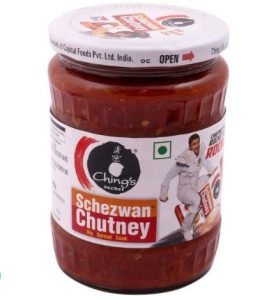Introduction
In addition to producing and marketing a wide range of dips, spreads, condiments, sauces, noodles, soups, pastes, dressings, ready-to-eat food products, and other food preparations, the plaintiff was one of India’s top food manufacturers. It was also the first to independently create the distinctive trade mark “SCHEZWAN CHUTNEY” for dips and spreads. The defendant was in the business of producing and selling food items such jams, Asian sauces, mayonnaise, pickles, and culinary sauces. According to the defendant, the mark “MRS. FOODRITE,” “MEAL TIME,” and “MRS. RITE SPICE” were used to advertise the defendants’ goods, and they were registered as trade marks in many classes.
[Image Sources : Jiomart]
The defendant was selling and offering for sale the contested item “MRS. FOODRITE SCHEZWAN CHUTNEY” on the online shopping site www.amazon.in in 2020 when the plaintiff discovered it. Additionally, the plaintiff claimed that the defendant had made every attempt to counterfeit or imitate the plaintiff’s trade mark because the defendant’s product bore a mark that was identical to the plaintiff’s mark, “SCHEZWAN CHUTNEY.”
Submissions on behalf of the Plaintiff
The plaintiff submitted that the plaintiff’s product and defendant’s product comprised of the following similarities:
- The defendant had adopted the plaintiff’s coined and registered trade mark “SCHEZWAN CHUTNEY”.
- The defendant’s impugned product, bearing “SCHEZWAN CHUTNEY”, was packaged/labelled in a trade dress/label which was deceptively and confusingly similar to the plaintiff’s “SCHEZWAN CHUTNEY”.
- The overall get-up of the impugned product, such as the packaging style, colour combination and scheme of the white, orange, and red, placement of “SCHEZWAN CHUTNEY” on the impugned label, “SCHEZWAN CHUTNEY “represented in two lines in white lettering on the colour combination of orange and red, and placement and arrangement of all essential and descriptive elements, had been copied by the defendant.
Additionally, the plaintiff discovered a product called “SZECHUAN CHUTNEY” that was identical to the plaintiff’s registered trade mark “SCHEZWAN CHUTNEY” as well as the defendant’s page/listing on www.facebook.com. The plaintiff claimed that the defendant had copied the plaintiff’s promotional materials, which were protected by copyright, without trying to create its own marketing and advertising content. As a result, the use of the marks “SCHEZWAN CHUTNEY” or “SZECHUAN CHUTNEY” amounts to trademark infringement against the plaintiff. The plaintiff also claimed that the defendant had misrepresented the origin of the items.
Submissions on behalf of the Defendant
The defendant claimed that it began using the mark “MRS. FOODRITE” to identify its Schezwan Chutney products in 2016 and has done so constantly and unbrokenly ever since. The defendants additionally argued that the plaintiff was not entitled to any exclusivity in the use of the mark “SCHEZWAN CHUTNEY” since it lacked any distinguishing qualities and was only a description of the kind, calibre, and origin of the offered goods. The defendant argued that the plaintiff had received registration in the said mark inadvertently.
The defendant further argued that the rival items might be identified by their separate trademarks, “MRS. FOODRITE” for the defendant and “CHING’S SECRET” for the plaintiff. The defendant claimed that other companies were also using the “SCHEZWAN CHUTNEY” mark to market their goods.
Decision
This Court was asked to decide whether the mark “SCHEZWAN CHUTNEY” was descriptive of the in question product.
According to the court, “SCHEZWAN CHUTNEY” represented a “CHUTNEY” (sauce) with a “SCHEZWAN” flavour, and if protection were to be granted to such a mark, then similar protection should also be granted to “Tamarind Chutney” or “Tomato Chutney” as they were also made up of words from both English and Hindi. The phrase “SCHEZWAN CHUTNEY” also met the second requirement outlined in “McCarthy on Trade Marks,” known as “The Competitors Need Test,” meaning that the phrase was likely to be used by the rivals to describe their goods.
The plaintiff argued that the mere use of the house mark by the parties, in this case “Ching’s” for the plaintiff and “MRS. FOODRITE” for the defendant, was insufficient to defeat the plaintiff, but the court noted that from the plaintiff’s advertisements, it appeared that the plaintiff used the words “SCHEZWAN CHUTNEY,” though prominently used, to describe the product and the mark that identified its source was, in fact, “Ching’s Secret.”
The plaintiff’s request for a grant of an ad interim injunction barring the defendant from using the mark “SCHEZWAN CHUTNEY” or “SZECHUAN CHUTNEY” was denied because the Court determined that the defendant’s use of the mark “SCHEZWAN CHUTNEY” could not be deemed dishonest. The Court did rule that the ad interim order issued in the case of Capital Food (P) Ltd. v. Radiant Indus Chem (P) Ltd., CS (COMM) 379 of 2020, was made absolute and would be in effect while the lawsuit was pending.
Conclusion
This Single Judge’s assessment was overruled by the Division Bench, who relied on the sales numbers and advertising costs expended by the Appellant to presumptively conclude that the Appellant has gained secondary “significance” and stay the Single Judge’s order. A circumstance where “other traders in that line of trade accept that such common word has come to denote the items belonging to a particular trader” is what is meant by secondary importance, according to a previous definition.
Author: Tanya Saraswat, in case of any queries please contact/write back to us via email to chhavi@khuranaandkhurana.com or at Khurana & Khurana, Advocates and IP Attorney.
References
- Bhumika Indulia & Prachi Bhardwaj, “Schezwan chutney” is a mere descriptive term; Delhi High Court rejects plea of capital food (P) ltd. of restraining radiant Indus Chem (P) Ltd. from using the word “Schezwan chutney” SCC Blog (2023), https://www.scconline.com/blog/post/2023/01/18/schezwan-chutney-imere-descriptive-term-delhi-high-court-rejects-plea-capital-food-private-limited-of-restraining-radiant-indus-chem-private-limited-from-using-the-word-schezwan-chutney-legal-research/ (last visited Mar 16, 2023).
- SpicyIP, Delhi High Court makes a U turn on secondary meaning and acquired distinctiveness SpicyIP (2023), https://spicyip.com/2023/01/delhi-high-court-makes-a-u-turn-on-secondary-meaning-and-acquired-distinctiveness.html (last visited Mar 16, 2023).




